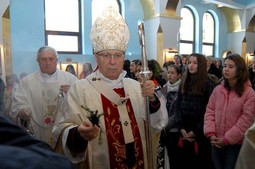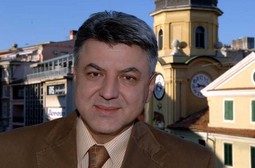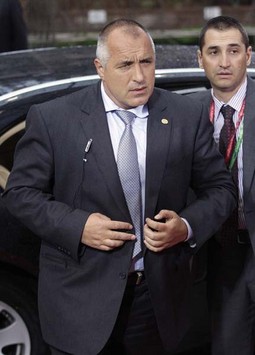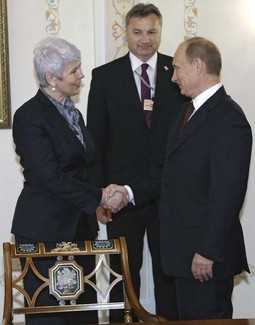Published in Nacional number 763, 2010-06-29
TENSE CONFLICT BETWEEN THE PREMIER AND KAPTOL
Church launches offensive against the HDZ
JADRANKA KOSOR'S AGREEMENT with Russian Premier Vladimir Putin to renew the DruzbAdria project has infuriated the Church
 MARIN SRAKIC Archbishop at the helm of the Croatian Bishop's Conference, which is yet to give its official position on the new developments surrounding the DruzbAdria project, but which informally supports the Church's oppositionThe Catholic Church is currently the greatest opponent to the realisation of the DruzbAdria project, which would make Omisalj on the island of Krk the main port for the export of Russian oil on the Mediterranean. The project could soon escalate into a tense conflict between the Croatian government and the top ranks of the Church, which has made its dissatisfaction with the work of Premier Jadranka Kosor very clear in recent months. This conflict already became visible with the announcement made by the Croatian National Brethren of the Franciscan Secular Order last week, in which it expressed its concern over the "reactivation of the detrimental DruzbAdria project" and attempts to earn profits off a project that was previously declared as ecological harmful. The statement very openly criticises the premier, with claims that it is difficult to understand how she today can support a project that she herself harshly criticised in 2004.
MARIN SRAKIC Archbishop at the helm of the Croatian Bishop's Conference, which is yet to give its official position on the new developments surrounding the DruzbAdria project, but which informally supports the Church's oppositionThe Catholic Church is currently the greatest opponent to the realisation of the DruzbAdria project, which would make Omisalj on the island of Krk the main port for the export of Russian oil on the Mediterranean. The project could soon escalate into a tense conflict between the Croatian government and the top ranks of the Church, which has made its dissatisfaction with the work of Premier Jadranka Kosor very clear in recent months. This conflict already became visible with the announcement made by the Croatian National Brethren of the Franciscan Secular Order last week, in which it expressed its concern over the "reactivation of the detrimental DruzbAdria project" and attempts to earn profits off a project that was previously declared as ecological harmful. The statement very openly criticises the premier, with claims that it is difficult to understand how she today can support a project that she herself harshly criticised in 2004.
THE FRANCISCAN SECULAR ORDER is a church institution in which members, although ordained, continue to live a secular life, though with very strong and organised ties to the Church. They are involved in numerous socially important and humanitarian activities. The Zagreb branch of the order has about 700 members, and as such is the largest in Europe.
THAT THE ORDER has its legal standing within the Church and that its members are often highly ranked within the Church hierarchy, such as the late Cardinal Franjo Kuharic. Nacional's source, who is well acquainted with relations within the Catholic Church, claims that these criticisms of the premier and the DruzbAdria project from the Franciscan order can be considered the unofficial opinion of the Church leaders in Croatia.
"There is no doubt that the announcement by the Franciscan order reflects the position of the Church leadership, and that the Church has been dissatisfied with the work of the premier and the government for some time. It is well known that the Church is dissatisfied with the constitutional amendments, particularly in the segment that limits voting among the Diaspora. Also, they have made it clear on several occasions that they do not support the government's proposed amendments to the Labour Act, and the information of a revival of the DruzbAdria project is a new sore spot. The Church was among the main opponents of DruzbAdria back in 2004, when the project was first discussed, and its revival was one of the main topics of the regular session of the Croatian Bishop's Conference in mid March in Sisak. There are several reasons why the Church is against DruzbAdria. The Church considers this project to be a classic example of the cheap sell-off of national interests, in which massive damages are risked for the sake of a small profit. Furthermore, for years, the project's main political sponsor was former President Stjepan Mesic, with whom the Church was almost constantly in conflict, and therefore the harsh stance of the Church towards that project was also somewhat motivated by this. Moreover, through its efforts against DruzbAdria in 2003, the Church greatly assisted the return of the HDZ to power, and the disappointment over the fact that this party has brought the project back to life is logical. In as much, it can be expected that the higher Church instances will express their opposition to the project in the near future," claims our source.
IN THAT CONTEXT, it is clear why the Catholic Church is, at this time, the main opponent of the DruzbAdria project. This fact could prove to be very awkward for the government, especially considering that strong opposition will also come from ecological associations, various political parties and other interest groups. As so it could happen again, like in 2003, that Church representatives, civil society associations and various left and right oriented political parties unit in the protests against DruzbAdria. As such, a very negative attitude on the project has been created, and this attitude was largely responsible for the loss of then Premier Ivica Racan in the parliamentary elections. The negative attitude still reigns in the public, and insisting on realisation of the project could result in a dramatic drop in popularity for the premier and ruling coalition.
In order to avoid such a scenario, the government will have to be much more careful and cautious than in 2003. That means convincing the public that today's project differs substantially from the version of the project in 2003, and that it can be realised without significant risks or damage to the environment, with significant economic gain. To succeed, the government will have to ensure a very transparent and independent environmental impact assessment is carried out, and that the project is opened to public debate. This was the main demand made in the Franciscan announcement.
 ZLATKO KOMADINA, Prefect of Primorje-Gorski Kotar County, has agreed to the DruzbAdria project if the environment can be preservedIN ANY CASE, the government will have problems with individual ecological associations that have already proclaimed the project to be detrimental, and have cast aside any possibility of giving their approval. The Eko Kvarner association is the leader among these associations. It was established in 2002 for the purpose of batting against DruzbAdria, and while doing so, its president Vjeran Pirsic affirmed himself as Croatia's main ecological activities. However, in recent years, he has compromised himself in recent years by releasing a series of untrue and, oftentimes, completely senseless information on large energy or infrastructure projects. The best known case was related to the planned construction of a liquid natural gas (LNG) terminal at Omisalj. He stated that he had reliable information that Qatar would build the terminal, with the intent of bringing liquid natural gas to Krk, and in returned shipping out potable water back to Qatar, water that the company INA would extract from underground wells around Udbina. However, the special LNG tankers do not even have the technical capability to transport water. Pirsic made a similar statement later, claiming that the terminal should not be in Omisalj due to the very high risk of terrorism there, and an explosion of the terminal would create a fireball that would destroy a large part of Kvarner Bay. Due to these and similar statements, Pirsic is considered by most experts to be a person who intentionally arouses public animosity towards the large energy projects and for that reason, unlike several other ecological associations such as Green Istria, cannot be a serious participant in the public debate on environmental protection. On behalf of Eko Kvarner, Pirsic sent an open letter to the premier last week calling for her to back away from the DruzbAdria project, claiming that this is an ecological harmful project with a significant possibility of catastrophic pollution of the Adriatic Sea with oil, while the revenues for the state would be virtually insignificant.
ZLATKO KOMADINA, Prefect of Primorje-Gorski Kotar County, has agreed to the DruzbAdria project if the environment can be preservedIN ANY CASE, the government will have problems with individual ecological associations that have already proclaimed the project to be detrimental, and have cast aside any possibility of giving their approval. The Eko Kvarner association is the leader among these associations. It was established in 2002 for the purpose of batting against DruzbAdria, and while doing so, its president Vjeran Pirsic affirmed himself as Croatia's main ecological activities. However, in recent years, he has compromised himself in recent years by releasing a series of untrue and, oftentimes, completely senseless information on large energy or infrastructure projects. The best known case was related to the planned construction of a liquid natural gas (LNG) terminal at Omisalj. He stated that he had reliable information that Qatar would build the terminal, with the intent of bringing liquid natural gas to Krk, and in returned shipping out potable water back to Qatar, water that the company INA would extract from underground wells around Udbina. However, the special LNG tankers do not even have the technical capability to transport water. Pirsic made a similar statement later, claiming that the terminal should not be in Omisalj due to the very high risk of terrorism there, and an explosion of the terminal would create a fireball that would destroy a large part of Kvarner Bay. Due to these and similar statements, Pirsic is considered by most experts to be a person who intentionally arouses public animosity towards the large energy projects and for that reason, unlike several other ecological associations such as Green Istria, cannot be a serious participant in the public debate on environmental protection. On behalf of Eko Kvarner, Pirsic sent an open letter to the premier last week calling for her to back away from the DruzbAdria project, claiming that this is an ecological harmful project with a significant possibility of catastrophic pollution of the Adriatic Sea with oil, while the revenues for the state would be virtually insignificant.
IT CAN BE ASSUMED that a large share of the public shares this attitude towards the project, especially after the catastrophic oil spill in the Gulf of Mexico. The risks Pirsic speaks of do exist, but it is quite certain that today's version of the project largely differs from the project that was proposed in 2002. Namely, at the start of the decade, when the talks on the pipeline first started, oil prices were very low, at about $20 per barrel. Given that price, transport fees were also low, and the projected gains for Croatia were small, while solutions for ecological issues were too expensive to be profitable in such a small profit margin. Today, the situation is very different, with oil prices ranging between $70-80, with a tendency to grow, and transit fees have grown several times over. Under such circumstances, DruzbAdria is a much more profitable project now than before, and in line with that there are options to implement all the available environmental protection technology that could be recommended in the Environmental Impact Study. This refers, above all, to the two fundamental ecological issues relating to this project: the risk of a tanker accident and oil spill in the Adriatic Sea, and the issue of ballast water. In order to sail safely and maintain stability when empty, oil tankers must take on sea water in a portion of their containers, and this water is released in port when they take on their cargo. Considering that this ballast water is often from other parts of the world, it can contain microorganisms that are not native in the Adriatic Sea and can be detrimental to the native flora and fauna. The issue of ballast waters has often been presented in the protests against DruzbAdria as an irresolvable issue, but that is completely untrue. Ballast waters today can be resolved with the construction of a purification plant.
THERE ARE CURRENTLY several available technologies for this purpose worldwide, from chemical purification in which chemicals are added to the water that cause the disintegration of all organic compounds, to more expensive purification treatments, such as those using infrared rays. According to unofficial information, such a plant at Omisalj would cost about EUR 55 million. The second method to prevent the negative impacts of releasing ballast waters is to implement the obligation that loading at Omisalj is only possible for boats whose last port of loading was in the Mediterranean, as this is considered to be the same ecosystem as the Adriatic Sea, and therefore there is no danger of contamination by alien species.
 Bojko Borisov, Bulgarian premier, was forced by the US to call off building a pipeline with RussiaWith regard to the risk of tanker accidents, this cannot be completely eliminated. However, by introducing rigid control protocols, such a risk can be minimizes. Today, tanker traffic is high in the Adriatic Sea, and the majority of transport goes through the Italian ports of Trieste and Venice. The ecological situation in the Italian part of the northern Adriatic is particularly sensitive, especially in the area of Venice, where tanker loader takes place for the refineries at Mantova and Margera, which have a processing capacity of about 8 million tons of oil per year.
Bojko Borisov, Bulgarian premier, was forced by the US to call off building a pipeline with RussiaWith regard to the risk of tanker accidents, this cannot be completely eliminated. However, by introducing rigid control protocols, such a risk can be minimizes. Today, tanker traffic is high in the Adriatic Sea, and the majority of transport goes through the Italian ports of Trieste and Venice. The ecological situation in the Italian part of the northern Adriatic is particularly sensitive, especially in the area of Venice, where tanker loader takes place for the refineries at Mantova and Margera, which have a processing capacity of about 8 million tons of oil per year.
NEAR TRIESTE is the start of the TAL (TransAlpine) pipeline, which supplies oil refineries in Austria and southern Germany. In 2007, a total of 33.6 million tons of oil was unloaded at Trieste from 394 tankers for TAL. Considering that the organisation of supervision over tanker traffic is imperative for the future safety of the Adriatic, DruzbAdria could serve as an opportunity to finally launch a high quality coast guard service and satellite vessel supervision system in the Adriatic.
On the other hand, DruzbAdria is a much different project today than it was in 2003, as it offers Janaf the opportunity to transform Omisalj from an ordinary loading port into a spot market for oil. This would be a type of oil exchange, where international customers could take oil immediately after making the transaction and transport it to the desired destination. The key for successful functioning of such a market is constant access to goods, and a reliable supply channel, which would be possible with the DruzbAdria pipeline. The benefits from such a spot market at Omisalj could have multiple benefits for Croatia. All trade in Omisalj would be subjected to the Croatian laws and taxes, and would bring substantial revenues for both the local community and the country. Croatia would secure a stable supply of oil for the domestic market, and through offers by multiple bidders would likely lower the prices of crude oil in Croatia to levels much lower than they are today. Ultimately, an oil market at Omisalj could be considered a strategically important resource, as it would make Croatia an important player in the supply and transport of oil for the whose of southeast Europe. All in all, such an institution could prove to be an important factor in the economic development of Primorje-Gorski Kotar County, and it is understandable why county prefect Zlatko Komadina stated that the county is interested in the project under the condition that all ecological standards be met.
On the other hand, even though there has been much public speculation in recent years that an oil market in Omisalj would be managed by the Russian company Gazproneft, according to unofficial information, one of the world's largest oil trading companies, which has its own capacities to sell at Omisalj, has also expressed its interest. If this information is correct, this is significant, as it indicates an important change in the stance of Western European countries and companies towards the DruzbAdria project. Though never confirmed, some speculated that the key reason why Croatia backed away from the project in 2004 was due to EU and US influences, as they were not in favour of an energy expansion by Russia into Southeast Europe.
 DEAL IN MOSCOW Jadranka Kosor met with Vladimir Putin on 19 June and discussed the revival of the DruzbAdria projectIT IS POSSIBLE THAT this stance has now changed, and that companies are seeing their interests in DruzbAdria, and this fact could influence the political aspect of the deal. On the other hand, some believe that Bulgarian Premier Bojko Borisov backed away from the competing pipeline Burgas - Alexandropouli due to US support, and so it is not unrealistic to expect that the Croatian premier could face a similar American initiative. A negative stance by the US or leaders of the EU, at the time when Croatia is completing its accession negotiations, in combination with a negative public perception could prove to be a massive burden on the government and Premier Kosor. If she wants to avoid such negative consequences, the government will have to rigidly abide by all legally prescribed procedures on assessing the ecological feasibility of the project. This, ultimately, could decide the fate of the DruzbAdria project, as well as a number of other very important bilateral issues between Croatian and Russia that depend on this project.
DEAL IN MOSCOW Jadranka Kosor met with Vladimir Putin on 19 June and discussed the revival of the DruzbAdria projectIT IS POSSIBLE THAT this stance has now changed, and that companies are seeing their interests in DruzbAdria, and this fact could influence the political aspect of the deal. On the other hand, some believe that Bulgarian Premier Bojko Borisov backed away from the competing pipeline Burgas - Alexandropouli due to US support, and so it is not unrealistic to expect that the Croatian premier could face a similar American initiative. A negative stance by the US or leaders of the EU, at the time when Croatia is completing its accession negotiations, in combination with a negative public perception could prove to be a massive burden on the government and Premier Kosor. If she wants to avoid such negative consequences, the government will have to rigidly abide by all legally prescribed procedures on assessing the ecological feasibility of the project. This, ultimately, could decide the fate of the DruzbAdria project, as well as a number of other very important bilateral issues between Croatian and Russia that depend on this project.
Related articles
Sanader’s eight fear SDP — Won’t bring down Government
Despite forecasts that he would, former Croatian Prime Minister Ivo Sanader, who recently took his seat in Parliament, will not work from the house… Više
Latest news
-
28.10.2010. / 14:15
'A profitable INA is in everyone's interest'
-
28.10.2010. / 09:38
Sanader’s eight fear SDP — Won’t bring down Government
-
21.10.2010. / 15:02
Interior Ministry turned a blind eye on Pukanic assassination
-
20.10.2010. / 09:34
Barisic could bankrupt HDZ




